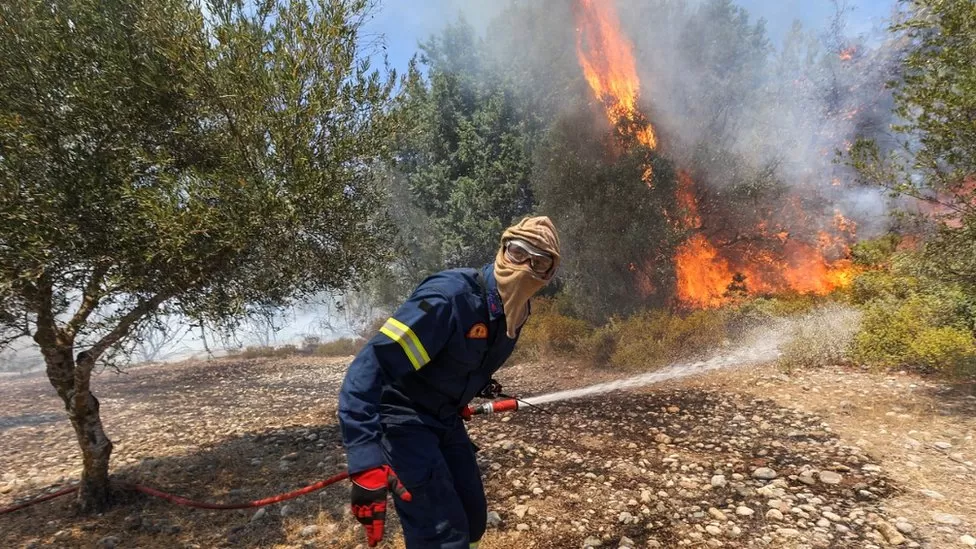More than 40 people have died in Algeria, Italy and Greece and thousands have been evacuated as Mediterranean wildfires threaten villages and holiday resorts.
The entire island of Rhodes has been put into a state of emergency, as fires also rage on Corfu and Evia.
The current long heatwave shows no let-up – temperatures are expected to rise above 44C (111F) in parts of Greece.
Fires in Sicily and Puglia have forced thousands of people to flee.
High winds and tinder-dry vegetation mean firefighters are struggling in many areas to douse the flames and create firebreaks.
The heaviest death toll so far is in Algeria, where the 34 victims included 10 soldiers surrounded by flames during an evacuation in the coastal province of Bejaia, east of Algiers. Bejaia is the worst-hit area, accounting for 23 of the deaths, local media report.
Algerian authorities said 80% of the blazes had been put out since Sunday, but a massive firefighting effort continues, involving about 8,000 personnel, hundreds of fire engines and some aircraft.
BBC News spoke to one man whose restaurant was razed by the fires. Adil El Selmy’s eco-friendly restaurant had stood halfway between Algerian towns Tabarka and Melloula. “We left the restaurant as the flames approached,” Selmy said.
Water disturbances experienced in Tabarka last week during an unprecedented heatwave made things even harder. “We couldn’t douse flames hours after the wooden building was devastated,” Mr Selmi said.
“I was employing 22 people,” he adds. “I don’t know how to get off this hook.”
The ravaged restaurant overlooks the sea. But the Mediterranean is barely seen, as the haze is still blanketing the area.
Fires have also raged in neighbouring Tunisia, where 300 people had to be evacuated from the coastal village of Melloula.
In Greece, the Civil Protection Ministry warned of an “extreme danger” of fire in six of the country’s 13 regions on Wednesday.
A team of climate scientists – the World Weather Attribution group – said this month’s intense heatwave in Southern Europe, North America and China would have been virtually impossible without human-induced climate change.
Two pilots died on the island of Evia, just north of Athens, when their Canadair firefighting plane crashed into a ravine. Elsewhere on the island a man’s charred body was found in a remote rural shack.
On the island of Rhodes more than 20,000 people have been evacuated from homes and resorts in the south in recent days. An airport official told AFP news agency that more than 5,000 had flown home on more than 40 emergency flights between Sunday and Tuesday.
Holiday firms Jet2 and Tui have cancelled departures for Rhodes for the coming days.
https://emp.bbc.com/emp/SMPj/2.50.2/iframe.htmlMedia caption,
Watch: BBC reporter sees wildfire spreading in Rhodes
Tourism accounts for one in five jobs in Greece, and the industry is vital for Rhodes and many other islands. The UK Foreign Office has not advised against travel to the affected parts of Greece, but has urged tourists to check with tour operators for updates.
Thousands of people have also been evacuated on Evia and Corfu, while Crete – another major holiday destination – is on high alert.
Italy has been hit by contrasting extreme weather events – with deadly storms in the north and wildfires in Sicily as well as several more southern regions.
A couple in their 70s were found dead in a fire-gutted holiday home near Palermo, after fire came close to the boundary of the city’s airport. An 88-year-old woman also died near the city.
Parts of the city of Catania went without water and power after cables burned in temperatures that climbed to 47.6C on Monday.
On the mainland, in Calabria, just east of Sicily, a man aged 98 was trapped by flames in his home and his daughter and son-in-law suffered burns while trying to save him.
A wildfire in the Foggia region, on Italy’s Adriatic coast, forced the evacuation of 2,000 people from hotels and campsites. The blaze approached Vieste from a nearby national park.
The storms in the north, meanwhile, claimed two lives on Tuesday – victims of falling trees.
Tornadoes, hailstorms and gale-force winds of up to 110km/h (70mph) struck Lombardy and other northern regions. Chiara Rossetti, 16, was on a scouts’ summer camp trip when her tent was hit by a tree in the province of Brescia.
“We are experiencing in Italy one of the most complicated days in recent decades – rainstorms, tornadoes and giant hail in the north, and scorching heat and devastating fires in the centre and south,” said Civil Protection minister Nello Musumeci.
He said he intended to appeal to the EU to boost its fleet of Canadair firefighting planes.
Portugal did not escape the heatwave unscathed, with more than 600 firefighters deployed to try to put out a fire in a national park in Cascais on Tuesday, near the capital Lisbon. Local residents were evacuated – some by wheelchairs – but no injuries were reported.
At least 130 firefighters worked to contain a fire near Croatia’s southern city of Dubrovnik, with water-bombing planes used to stop a wildfire that burnt across the region on Monday. Local media reported that undetonated landmines exploded as a result of the fire.
Fires also broke out on the French Mediterranean island of Corsica in the early hours of Wednesday. Gales of up to 130km/h (80mph) whipped up the flames and for several hours three villages came under threat.
